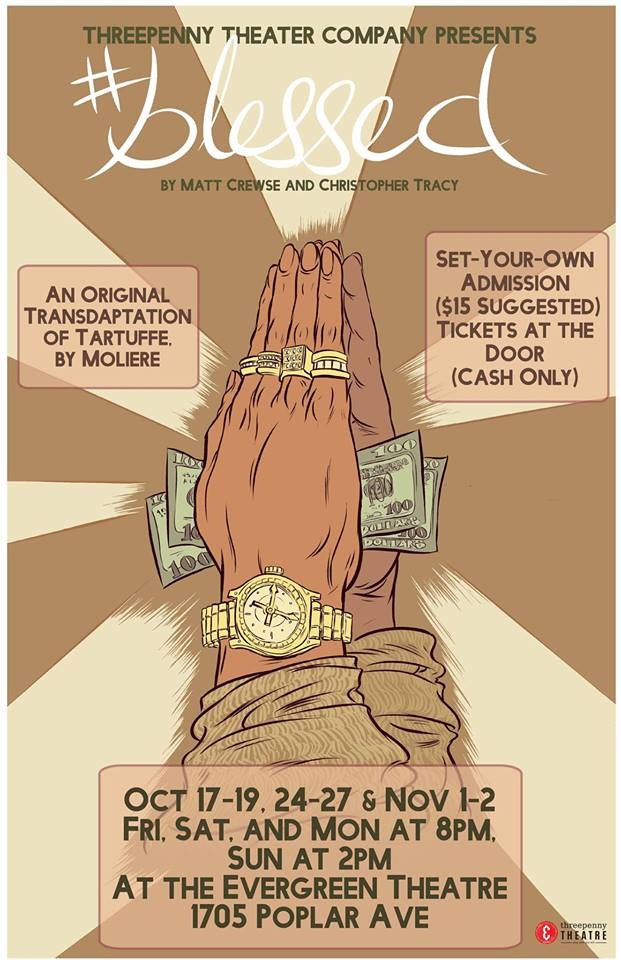
I’m starting with a spoiler and I’m not even sorry. There’s a scene near the end of #Blessed where Dick, the show’s ostensible villain, is taken down by a cop with a Taser gun. It’s a literally shocking depiction of excessive force that, absent some broader context, simply invites audiences to laugh at a law enforcement officer abusing a character we’ve been conditioned over time to dislike. It is at once the show’s most cringeworthy moment, and its most interesting. That the gag’s dangling cultural reference gets laughs is more thought provoking than anything that happens onstage.
Conceptually, Threepenny Theatre Company gets a lot right with its current interpretation of Moliere’s Tartuffe. They don’t hide behind the play’s famous name and reputation, but take ownership of and responsibility for a well known satirical farce that’s been slightly reconfigured by augmenting Moliere’s classic swipe at religious hypocrisy and middle class values with convoluted political messaging and apologia. The show’s creators, Matt Crewse and Christopher Tracy christened their work #Blessed, which is kind of elegant. They describe it as a “transdaptation,” which is awkward, accurate, and perfect for a performance that has no idea where it’s going or what it wants to be. Except for where it clearly wants to be Mama’s Family.
As mentioned above, #Blessed turns Tartuffe, the play’s original namesake character, into a running Dick joke, with lines of dialogue that sound like episode titles from Third Rock From the Sun. The original Tartuffe is a classic wolf in sheep’s clothing, feigning extreme piousness to form parasitic relationships with the needy and the devout. He injects his own greedy agenda into his intended victims’ personal belief systems, like a virus, as he trolls for money and sex. Dick, as played by the often superb John Dylan Atkins, is a loud, ranting Jesus- jerk whose extreme, and extremely repulsive behavior calls to mind the rambunctious physical comedy of the late Chris Farley, but without the subtlety. Credibility is strained from the top because it’s impossible to understand how anybody not dangerously ignorant in their own right, might be taken in by a boogery clown of such outsized proportions. Atkins is a courageous actor who gives every role everything he’s got. It’s usually a good thing but this time around it’s just exhausting.
Atkins’ unrealistic, over-the-top approach is reflected by the entire company of actors who achieve the scale, but not the specificity that makes for effective commedia-inspired clowning.
For all of its bluster, #Blessed wants to be too many things too timidly. It wants to make ham-fisted comments about about religion and politics in America today. But it also wants to apologize for these same things by way of a character who, having no other part in the action, drops in from time to time to defend communities of faith with sensible monologues that sound suspiciously like ads for Midtown’s progressive First Congregational Church. It’s an extreme violation of the show-don’t-tell principle of good theatrical storytelling even if Jerry Kimble is the most believable person on stage.
In Memphis, a city with its share of mega-churches, and mega-problems it’s easy to see why this 350-year-old play gets a full-on place-specific remake every ten years or so. And in an age of purity balls and overt anti-feminism, even arranged marriages, the source material’s most archaic plot device, don’t seem that far fetched. There is no reason in the world why a bright young company like TPC shouldn’t be able to transform Tartuffe into something edgy and up to date. But even with so many of the right ingredients in place, and chunks of the original script left more or less in tact, #Blessed is seldom more than a manic, muddled two-act SNL skit, that overflows with good intentions and sketchy judgment.
Even if its latest effort was less than successful artistically (don’t get me started on how much better it is to have no set than a clunky one) it’s good to see that TPC isn’t just a one trick pony producing a safe slate of Shakespeare’s greatest hits. I should probably mention that, criticisms aside, the show received a standing ovation on opening night, from a healthy, refreshingly young audience that seemed to genuinely appreciate the messy effort.